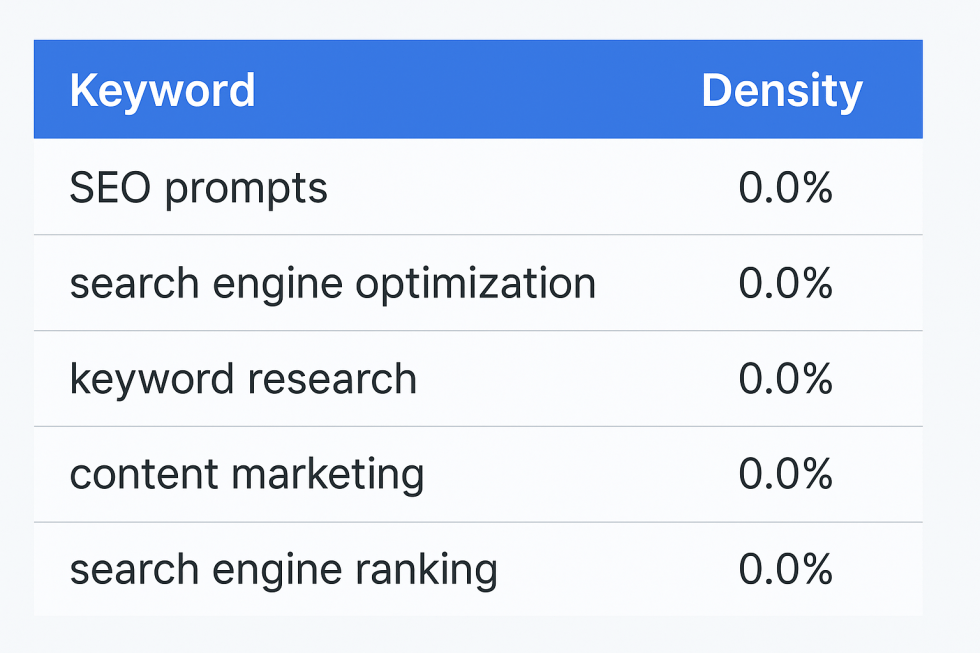
Introduction
In the world of search engine optimization, SEO prompts have become powerful tools for content creators. They guide your writing process, ensuring relevance and effectiveness. This guide explores how to use SEO prompts for better rankings and traffic.
In this guide, we'll explore what SEO prompts are, why they matter, and how to use them effectively for keyword research and content marketing. Whether you're a beginner or an experienced marketer, these tips will help you elevate your content strategy.
When writing from these prompts, incorporate related terms naturally and keep the tone conversational. Avoid keyword stuffing—focus instead on answering real questions and solving real problems for your audience.
What are SEO Prompts?
SEO prompts are structured cues or ideas designed to guide content creation toward specific keywords, topics, or user search intents. They help ensure that your writing aligns with SEO basics and content creation best practices.
In short, SEO prompts act as a roadmap for creating content that is informative, engaging, and optimized for online visibility.
Types of SEO prompts include:
- Keyword-based prompts - Focused on specific target keywords
- Question-based prompts - Based on user queries and "People Also Ask" suggestions
- Long-tail prompts - Using extended, niche phrases with lower competition
Benefits of Using SEO Prompts
In the ever-evolving world of SEO search engine optimization, SEO prompts have become a powerful tool for writers, marketers, and businesses. They serve as targeted cues that guide your content creation, ensuring relevance, accuracy, and efficiency.
By strategically using the best SEO prompts, you can boost your search engine ranking, attract more visitors, and create engaging, high-quality articles. In this guide, we’ll explore what SEO prompts are, why they matter, and how to use them effectively for keyword research and content marketing.
Whether you're a beginner or an experienced marketer, these tips will help you elevate your content strategy.
- Improved Search Rankings - Well-optimized content aligns with Google's algorithms
- Increased Website Traffic - Higher rankings lead to more clicks and visits
- Better Content Quality - Prompts ensure articles stay relevant and useful
Top 10 SEO Prompts for Better Content
SEO prompts are structured cues or ideas designed to guide content creation toward specific keywords, topics, or user search intents. They help ensure that your writing aligns with SEO basics and content creation best practices.
Here are ten powerful SEO prompts you can use:
1. Keyword-Based Prompts
- Keyword-based prompts – Focused on specific target keywords. Example: "What is [keyword] and why is it important?" Great for matching voice search queries and featured snippets.
For example, a keyword-based prompt like "How to optimize meta descriptions for SEO" can guide you to create a post that's both useful and search-friendly. When combined with content marketing strategies, prompts help maintain consistency across blog posts, landing pages, and social media updates—maximizing both reach and engagement.
2. Question-Based Prompts
- Question-based prompts – Inspired by user queries or "People Also Ask" suggestions.
3. Long-Tail Keyword Prompts
- Long-tail prompts – Based on extended, niche phrases with lower competition. Example: "Best budget-friendly [keyword] for beginners in 2025" Perfect for targeting specific niches with lower competition.
4. Problem-Solution Prompts
When used effectively, these prompts improve search engine optimization by ensuring your content is relevant and comprehensive. They also help maintain focus, making it easier to meet the needs of both search engines and human readers.
5. Comparison-Based Prompts
- Comparison Based Prompts -Example: "How to fix common [keyword] mistakes" Builds authority by addressing user pain points.
6. Tutorial-Style Prompts
Incorporating the best SEO prompts into your writing process offers numerous advantages: Example: "Step-by-step guide to [keyword] for beginners" Creates comprehensive, actionable content that ranks well.
7. List-Based Prompts
Example: "10 best [keyword] tools for 2025" List posts are shareable and often appear in search snippets.
- Increased Website Traffic – Higher rankings naturally lead to more clicks and visits.
8. Location-Based Prompts
- Better Content Quality – Prompts ensure your articles stay relevant, accurate, and efficient, making them more useful to readers. Example: "Best [keyword] services in [city/region]" Perfect for local SEO and geo-targeted content.
9. Industry-Specific Prompts
Example: "[Keyword] strategies for [industry/niche]" Creates specialized content for specific audiences.
10. Trend-Based Prompts
Example: "[Keyword] trends and predictions for 2025" Keeps content current and capitalizes on emerging topics.
By leveraging NLP principles, SEO prompts enhance relevance by aligning content with user intent. They improve accuracy by keeping articles focused on target keywords, and they increase efficiency by streamlining the writing process.SEO prompts are structured cues or ideas designed to guide content creation toward specific keywords, topics, or user search intents. They help ensure that your writing aligns with SEO basics and content creation best practices.
Best Practices for SEO-Optimized Content
Optimize Meta Elements
Write compelling meta titles and descriptions to boost click-through rates.When used effectively, these prompts improve search engine optimization by ensuring your content is relevant and comprehensive. They also help maintain focus, making it easier to meet the needs of both search engines and human readers. In short, SEO prompts act as a roadmap for creating content that is informative, engaging, and optimized for online visibility.- Long-tail prompts – Based on extended, niche phrases with lower competition.
Add Strategic Links
Common Mistakes to Avoid
Avoid these pitfalls when using SEO prompts:
Over-Optimization
Keyword stuffing can lead to search engine penalties and poor user experience.
Incorporate Keywords Naturally
Maintain a keyword density of about 1–2%. Include your main keyword in the title, introduction, and at least one subheading, while sprinkling related LSI keywords throughout.
Optimize Meta Elements
Write compelling meta titles and descriptions to boost click-through rates.- Long-Tail Keyword Prompts**
** Example: “Best budget-friendly [keyword] for beginners in 2025.” Learn why they work in our long-tail keyword guide.
Ignoring Search Intent
Content that doesn't align with user needs will perform poorly in rankings.
Neglecting Updates
SEO is dynamic - regularly refresh content with updated information.
Relying Only on Prompts
Use prompts as inspiration while adding unique insights and expertise.
Add Internal & External Links
Link to content marketing strategies and authoritative sources to build credibility.
Focus on User Experience (UX)
Fast-loading pages, mobile-friendly layouts, and logical navigation all enhance SEO.
FAQ Section
Conclusion
SEO prompts are valuable tools for creating focused, engaging, and high-ranking content. By using them effectively for keyword research and content creation, you can boost visibility, attract more visitors, and improve conversions.
SEO prompts can be an essential part of your keyword research process. Start by brainstorming topics relevant to your audience. Use tools like Google Keyword Planner, Ahrefs, and SEMrush to find keywords with high search volume and manageable competition.
Remember to avoid common mistakes, follow best practices, and consistently track your results. When integrated with a strong content marketing strategy, SEO prompts can transform your writing process and help you achieve better search rankings.
Start implementing these SEO prompts today and watch your search performance improve! For example, if your main topic is "email marketing," a long-tail prompt like "How to improve email open rates for small businesses" can help you target a specific niche.
📧 Stay Updated
Get the latest web development tips and insights delivered to your inbox.




